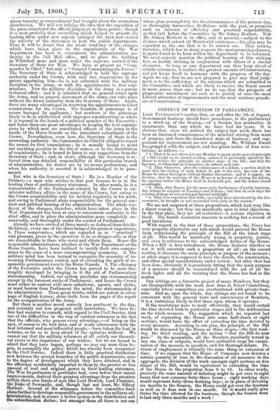CONDUCT OF BUSINESS IN PARLIAMENT.
LORD PALMERSTON'S motion that, on and after the 7th of August, Government business should have precedence, is the preliminary to a wind-up of the Session,—of a Session less productive in enactments than any which we have had for years. It is obvious that, since we noticed the subject last week, there has been an increased consciousness of the mischief arising from want of purpose, and from the disordered state of business ; and sug- gestions for improvement are not wanting. Mr. William Ewart has grappled with the subject, and has given notice of four reso- lutions, as follows :— " 1. That it be not allowed to any Member to speak on the general principle of a bill except on its second reading, unless it be previously agreed by the House to debate the principle on another stage of the bill ; and that the Speaker, or Chairman in Committee, do enforce such rule. 2. That whenever, after the continuance of a debate, a motion shall be made that the closing of such debate be put to the vote, the vote of the House be taken thereupon without further discussion ; and if it appear, on division, that the majority of the House is in favour of closing the debate, the question before the House shall be forthwith put, and the debate closed accordingly.
" 3. That, after Easter, for the more early furtherance of public business, day sttings be adopted on Tuesdays and Fridays; but that on such days the evening sittings be not prolonged beyond midnight. " 4. That it is expedient that bills, especially those introduced by the Go- vernment, be brought on and proceeded with early in the session.'
We are not surprised at these propositions, which look very like a direct remedy ; but they are manifestly open to fatal objections. In the first place, they are all restrictive—a serious objection in itself. The fourth resolution amounts to nothing but a record of good intentions.
With regard to the first of these propositions, the Times has very properly objected to any rule which would prevent the House from rediscussing the principle of the Bill at the latest stage of all. This would be manifestly wrong in propriety, justice, and even in reference to the acknowledged duties of the House. When a Bill is first introduced, the House declares whether or not it will entertain such a proposition at all ; on the second reading it discusses the main principle or purpose of the measure ; at other stages it is supposed to have the details, the construction, and other special considerations under review ; but after that has been done, obviously it is peculiarly fitting that the main purpose of a measure should be reconsidered with the aid of all the fresh lights and all the training that the House has had in the matter.
Day sittings are a favourite project of many Members, but they are incompatible with the work now done in Select Committees, especially where committees are overburdened with private busi- ness. And as, upon the whole, day sittings are not found to be consonant with the general taste and convenience of Members, it is a restriction likely to fret those upon whom it operates. If the resolutions were to work effectively, they would curtail the time devoted both to particular stages and to the deliberation on the whole measure. The suggestion which we repeated last week, of separating the House into some half-dozen or eight sections, would have the effect of extending the time devoted to every measure. According to our plan, the principle of the Bill would be discussed by the House at three stages,—the first read- ing, the third reading, and the Motion " that the Bill do now pass." In the meanwhile, all the Members peculiarly versed in any one class of subjects, would have unlimited scope for exami- nation of the measure in question, and for thorough debate. Di- vision of employment is virtually the same thing as extension of time. If we suppose that the House of Commons now devotes a certain quantity of time to the discussion of all measures in the aggregate, the division of the work amongst eight sections on five stages of the Bill, would be equivalent to extending the time of the House in the proportion from 8 to 43. In other words, precisely the same amount of debating might be got over in eight hours that now consume forty-three hours ; eight working days would represent forty-three working days; or in place of devoting
six months to the Session, the House could get over the business as well as it does now in one month. Or it would really give thrice the time allowed for the business, though the Session were
to last only three months and a week !


























 Previous page
Previous page